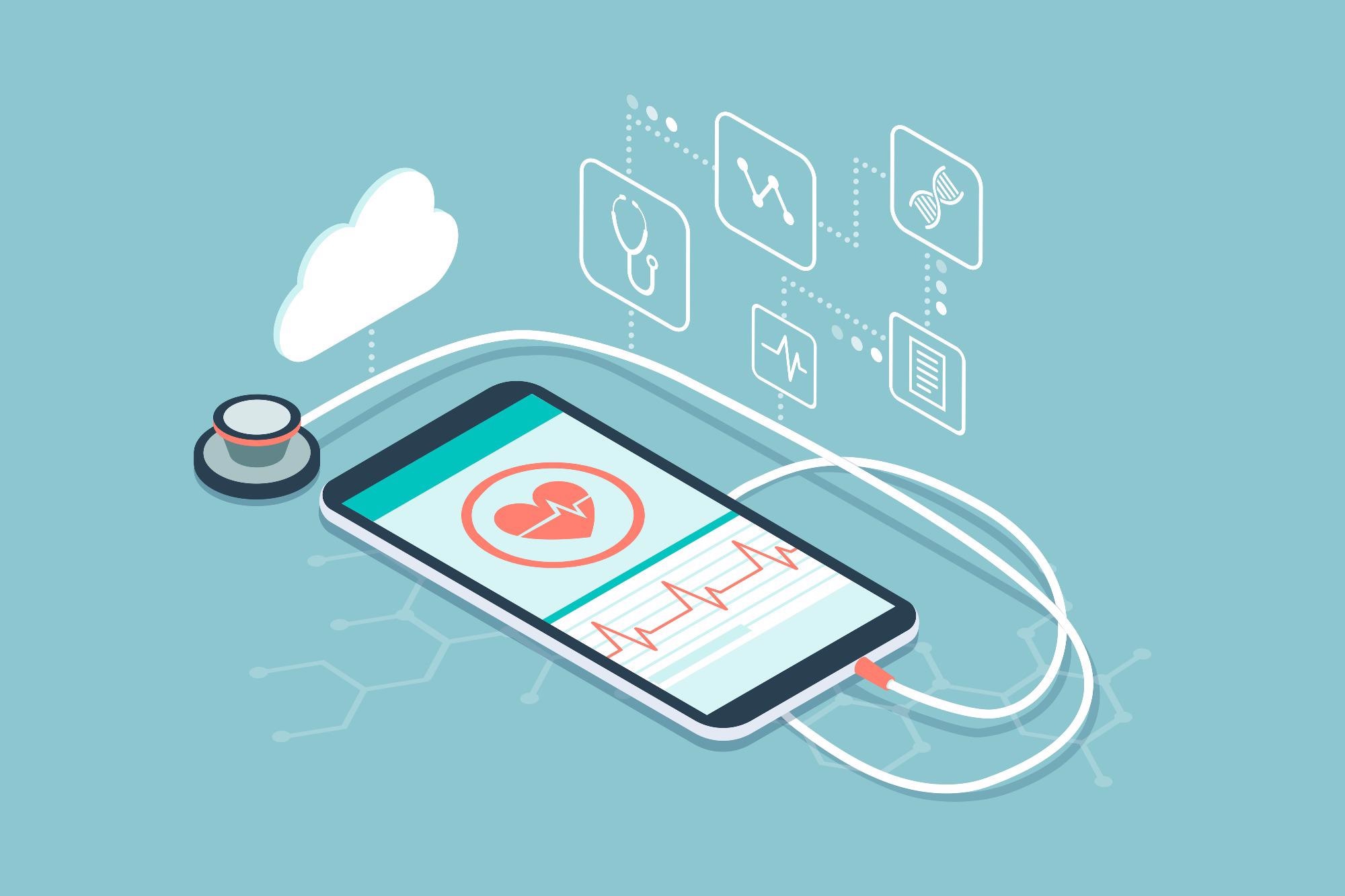The future of public health looks set to become increasingly digital. The coronavirus disease 2019 (COVID-19) pandemic led to unprecedented disruption to both the global economy and healthcare. This spurred a demand for digital transformation, particularly in the area of diagnosis and a need for digital surveillance and other solutions, such as telemedicine, to tend to patient needs.
This article takes a look at what is meant by digital health technology, briefly assesses the pros and cons of its uptake, and considers the impact the COVID-19 pandemic has had on the adoption of digital measures.

Image Credit: CKA/Shutterstock.com
The COVID-19 pandemic and healthcare services
The SARS-Cov-2 outbreak occurred in the Chinese city of Wuhan in the winter of 2019 and soon after in March 2020 a global pandemic was announced. This COVID-19 pandemic created widespread disruption to healthcare services across the globe. The effects were both direct and indirect:
- Direct disruption as a result of the outbreak of infectious disease
- Indirect disruption due to public health measures to mitigate infectious transmission
The pandemic caused large-scale pressures on healthcare services. This spurred dramatic fluctuations in demand and upon capacity. Economic pressures and multifarious social factors prompted governments worldwide to reopen societies. But this reopening required the careful balancing of public health measures such as social distancing and infection control.
The pandemic created an urgent demand for digital transformation necessitating the possibility for remote working and continued service provision in the face of pressures to maintain safety measures. In short, the COVID-19 pandemic presented an urgent opportunity for the adoption of digital health technologies.
What is digital health technology?
Digital health incorporates the use of information technology, wearable devices, telehealth, mobile health, and telemedicine. Digital health technology has no exact definition though generally speaking it can be agreed upon that it incorporates the following: “Digital health refers to the use of information and communications technologies in medicine and other health professions to manage illnesses and health risks and to promote wellness” (Ronquillo et al., 2021).
In diagnostics, digital solutions have been integrated with traditional methods. Here AI-based diagnostic algorithms are based on imaging and clinical data. In the area of surveillance, digital apps have proven to be effective. The needs of patients in the area of prevention have been tackled via the adoption of tools such as telemedicine and telehealth.
Notwithstanding the above definition, which is in any case broad in scope, digital health can vary in meaning. Ronquillo et al., 2021 have listed the various sub-categories of digital health products and services thus: remote sensing and wearables; telemedicine and health information; data analytics and intelligence, predictive modeling; digitized health record platforms; DIY diagnostics, compliance, and treatments; patient -physician-patient portals; health and wellness behavior modification tools; bioinformatics tools (-omics); decision support systems; medical social media and imaging.
What are the benefits of adopting digital health practices?
According to Ronquillo et al., 2021 digital health is growing in popularity because it is anticipated it will:
- Improve access to healthcare
- Improve the quality of that care
- Lower the cost of care
- Reduce inefficiencies in the healthcare system
- Provide more personalized healthcare for patients
What are the problems associated with digital health practices?
The problems include concerns over the effectiveness and regulation of digital technologies and the challenges of privacy and other legal and ethical challenges. There are further concerns about inequalities and the digital divide. Patients that wish to access these services require a digital device suitable for video conferencing and a reliable internet connection. This can preclude many patients in older age groups who may require a caregiver who could take on a mediating role.
Evidence of the effectiveness of the technologies is needed if they are to become adopted on a grander scale. Contract tracing apps had been adopted by over 40 countries but there was a lack of evidence as to how effective these apps were (Budd et al., 2020). Furthermore, there are concerns over the digital divide because presently just 49% of the world population is online (correct as of 2020, Budd et al.)

Image Credit: elenabsl/Shutterstock.com
The divided view on the impact of digital technologies
Expert opinion is currently divided on the impact and effectiveness of digital health measures. Some say they have served us well and we should capitalize on the inertia for the implementation of digitalization that has been exacerbated by the pandemic situation. On the other hand, some believe it is difficult to quantify precisely what benefits have been availed in response to the pandemic and contend that there is no silver bullet.
What is clear is that there is a need for the alignment of international regulatory strategies over digital technologies and their effective utilization. This will aid us in preparedness for outbreaks of infectious disease or the event of a pandemic in the future.
References:
- Budd, J. (2020) Digital technologies in the public-health response to COVID-19. Nature Medicine. Doi: 10.1038/s41591-020-1011-4
- Golinelli, D. (2020) Adoption of Digital Technologies in Health Care During the COVID-19 Pandemic: Systematic Review of Early Scientific Literature. Journal of Medical Internet Research. Doi: 10.2196/22280
- Gunasekeran, D. V. (2021) Digital health during COVID-19: lessons from operationalising new models of care in ophthalmology. The Lancet Digital Health. Doi: 10.1016/S2589-7500(20)30287-9
- Ronquillo, Y. (2021) Digital Health. Treasure Island (FL): StatPearls Publishing. Online: https://www.ncbi.nlm.nih.gov/books/NBK470260/
Further Reading
Last Updated: Mar 22, 2022